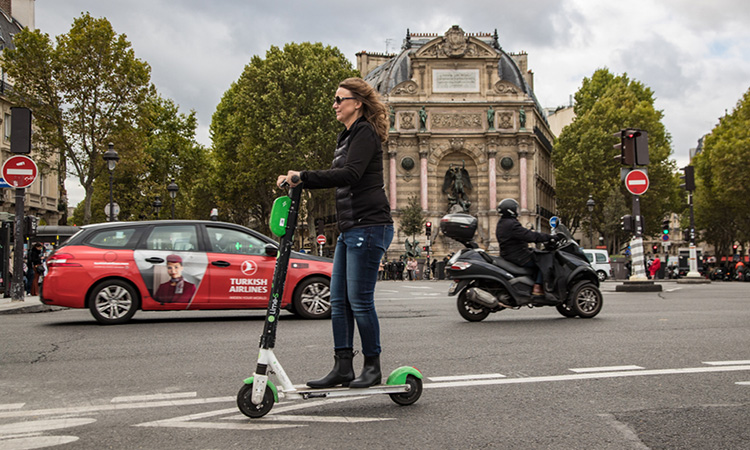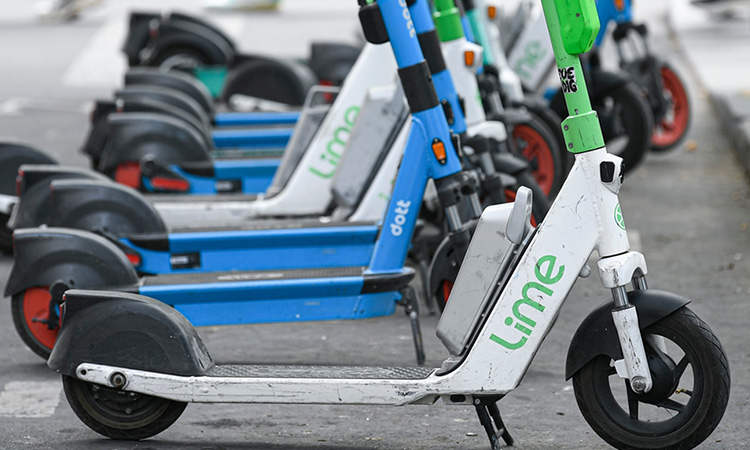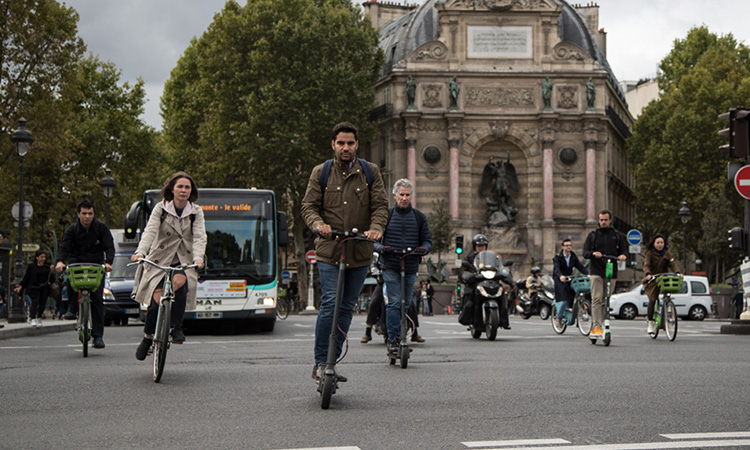Halting the progress of e-scooters: Why is Paris taking a step backwards?
- Like
- Digg
- Del
- Tumblr
- VKontakte
- Buffer
- Love This
- Odnoklassniki
- Meneame
- Blogger
- Amazon
- Yahoo Mail
- Gmail
- AOL
- Newsvine
- HackerNews
- Evernote
- MySpace
- Mail.ru
- Viadeo
- Line
- Comments
- Yummly
- SMS
- Viber
- Telegram
- Subscribe
- Skype
- Facebook Messenger
- Kakao
- LiveJournal
- Yammer
- Edgar
- Fintel
- Mix
- Instapaper
- Copy Link
Posted: 18 April 2023 | Leah Hockley - Intelligent Transport | No comments yet
Following the result of the Paris referendum on the future of shared e-scooters in the city, Intelligent Transport’s Editor, Leah Hockley, considers what happened and what the impact may be on the future of micro-mobility, and consults a range of stakeholders from across the industry to find out what the response has been from those directly involved.


It is undeniable that the micro-mobility industry has more barriers to tackle in order to ensure its future success than any other type of public or shared transportation. And, despite proven environmental and economical benefits, e-scooters, in particular, have had the hardest battle to fight thus far. The main driver of the argument against the widespread introduction of shared e-scooters is often safety concerns, as opposers highlight the number of incidents that involve e-scooters as evidence of their danger. However, the data regarding e-scooter incidents is rarely put into a relative context; should this happen, data would show that it is not shared e-scooters that are the problem, but it is in fact the improper use of private e-scooters that needs to be of concern and the better regulation of shared e-scooters that must be a main priority.
Data would show that it is not shared e-scooters that are the problem, but it is in fact the improper use of private e-scooters that needs to be of concern”
Despite this, on 2 April 2023, the micro-mobility industry’s worst nightmare was made a reality: the result of a referendum held in Paris saw citizens vote against the continuation of shared e-scooters in the city. The whole world had its eyes on Paris in the months leading up to the referendum and, though it may not necessarily have been entirely unexpected given the news that was coming out of the city ahead of the day of the vote, the result has still proven to be a blow to the industry’s morale.
The Mayor of Paris, Anne Hidalgo, announced the referendum on 14 January 2023 during an interview published in Le Parisian. According to Forbes, while Mayor Hidalgo said she that favoured a ban, she ultimately felt that the residents of Paris should have the final say. Though the vote was advisory and Mayor Hidalgo can still choose to extend the e-scooter permits or re-tender the programme, should she choose, French news channel BFM TV has reported that Mayor Hidalgo has assured that there will be no more shared e-scooters available from 1 September 2023.
Speaking to BFM TV, the French Minister for Transport, Clément Beaune, called the referendum “a huge democratic flop”, and said that it was a “double failure for the Mayor of Paris: the rejection of the scooters that she herself installed and never knew how to regulate, unlike so many other cities in France, a humiliating participation rate, a vote ignored and shunned by the vast majority of Parisians.”


Voting difficulty
Many operators within the industry have expressed their disappointment in the structure of the vote. An official statement from the operators involved (Dott, Lime and TIER Mobility) said: “We acknowledge the result of this unprecedented referendum, which was heavily impacted by very restrictive voting methods. This led to an extremely low turnout, heavily skewed towards older age groups, which has widened the gap between pros and cons.” The restrictive voting methods referred to within the statement, which are being cited by many industry stakeholders as having a direct impact on the result, are as follows:
- There were 21 designated voting locations, meaning that there was only one location per borough
- There were 203 voting boxes available – in comparison, there were 899 voting boxes available for the Presidential election in April 2022 – resulting in long lines outside of the voting locations
- Voters were unable to vote online, nor were they able to vote by proxy
- Only registered Paris residents were able to vote, meaning that people living just outside of the city and commuting in were unable to offer their opinion
- The referendum was conducted on the day of the Paris Marathon.
Moving away from shared e-scooters isolates Paris from the rest of the world, with major capitals… enabling this form of decarbonised transport”
As a result, turnout for the referendum was shockingly low, with just 7.46% of registered Parisian voters choosing to vote, which represents less than 5% of the total city population. An official statement from Micro-Mobility for Europe (MMfE) highlighted a concerning prediction: “A small group of people have had a disproportionate influence on the city’s urban mobility system, which will also have a detrimental effect on sustainability: as Transport & Environment’s Clean Cities Campaign stated, the ban could result in up to 10,000 extra journeys by car per day.”
Further to this, according to MMfE, discontinuing shared e-scooters in Paris will come at the cost of many citizens who wish to diversify their travel beyond private car ownership. Moving away from shared e-scooters isolates Paris from the rest of the world, with major capitals like Washington, Madrid, Rome, London, Berlin and Vienna further enabling this form of decarbonised transport.


Missed potential
Micro-mobility is often considered to be one of the main ways in which modal shift can be encouraged within cities, by offering residents and visitors alike an attractive alternative to the private car and a solution to tackle first- and last-mile trips. The potential that e-scooters hold to support more sustainable transport is vast, and cities across the globe are taking advantage of that opportunity in order to support their emission reduction efforts.
An official statement from Bolt highlighted that, by introducing a ban on shared e-scooters, Paris will be taking a step backward: “Scooters are a more sustainable alternative to private cars, especially for short trips. Our research proved that almost 40% of Bolt scooter trips are connected to public transport, which means they are used as the last-mile solution, connecting people to the starting point of their trip to a bus, metro or train stop. Considering the potential of shared scooters to make a positive change in the city and the constantly evolving technologies that we’re using to make scooter operations safe for everyone, we believe that resigning from shared scooters would be a step backward in building better cities.”
With this focus on sustainable transportation to and from the Games, there appears to be significant discourse between the goals of the City of Paris and the reality of the situation”
Further to this, from 26 July 2024 to 11 August 2024, Paris will be hosting the 2024 instalment of the Olympic Games. In line with its commitment to offer sustainable transportation for both residents and tourists who are interested in attending the Games, on 14 February 2023, the City of Paris had announced that a network of 60km of bike paths will be introduced across the city to connect the Games competition sites. In addition, 10,000 bicycle parking spaces will be installed and 3,000 additional Vélib’ (the public bike-sharing system in Paris) bikes will be put into service. With this focus on sustainable transportation to and from the Games, there appears to be significant discourse between the goals of the City of Paris and the reality of the situation, and raises the question as to why shared e-scooters have been unable to take their place next to bikes in offering a more sustainable alternative to the private car.
The official joint statement from Dott, Lime and TIER Mobility noted: “We regret that Parisians will lose a shared and green transport option. The result of this vote will have a direct impact on the travel of 400,000 people per month, 71% of whom are 18-35 year old residents. It is a step back for sustainable transport in Paris ahead of the 2024 Olympics.”


Industry responses
After requesting an exclusive comment on the ban of shared e-scooters in Paris from multiple stakeholders within the micro-mobility industry, Intelligent Transport received the following:
Micro-Mobility for Europe
Pauline Aymonier, Co-Chair of Micro-Mobility for Europe (MMfE), said: “MMfE naturally regrets the outcome of the referendum, which we believe will have a detrimental impact on Paris’ ability to meet its sustainability targets. Whilst it is important to recognise the suboptimal conditions in which the voting took place, we most find regrettable that the ban could result in up to 10,000 extra car journeys per day, as highlighted by Transport & Environment. But, at a time where so many European cities like London, Madrid or Lyon design policies to encourage the uptake of micro-mobility, we remain fully committed to working with them in driving the sustainable mobility transition forward.”
TIER Mobility
Erwann Le Page, Public Policy Director – Western Europe at TIER Mobility, said: “A referendum sounds like a great idea. If there is an important issue, ask the people what they think and be guided by the wisdom of the crowd and adhere to democracy. But, as we move from a car-centric urban planning environment, this kind of push-back is to be expected. Is it not the job of elected representatives to look ahead to the future and manage these kinds of situations, guaranteeing our freedoms and the way in which they are exercised in respect of others? Should such a freedom be abolished when 92.5% of the people have not had their chance to give their say?
The referendum is all the more perplexing because owners of privately owned e-scooters are not affected by this vote, despite the comparative lack of regulation around their use”
“The referendum is all the more perplexing because owners of privately owned e-scooters are not affected by this vote, despite the comparative lack of regulation around their use compared to shared e-scooters. We fear that the Paris decision will cause a shift towards both car usage and the purchase and use of personal e-scooters.
“Is the vote to ban in Paris now also leading to louder calls for a ban on rental e-scooters in many cities in Europe and around the globe? Highly unlikely, as we see that the vast majority of cities remain calm for the time being after the Paris vote and continue to focus on implementing smart regulations to ensure that e-scooters are well integrated into the urban transport mix. This is the right approach and the way forward for the shared micro-mobility industry.”
Voi Technology
Jack Samler, General Manager – UK, Ireland and France at Voi Technology, said: “We have been watching the Paris situation with great interest. E-scooters and micro-mobility in general is more than just a trend – it is revolutionising transport across the UK. Already, people are relying on e-scooters to get to work or education reliably and without causing congestion and air pollution.
We’d like to… enable more people to benefit from shared e-scooter schemes, which is why we’re calling on the government to give us clarity about when e-scooter legislation will be passed”
“E-scooters are a safe and affordable form of transport – and the only public transport in the UK which is not subsidised by taxpayers. In this country, we’d like to work with the government and local authorities to enable more people to benefit from shared e-scooter schemes, which is why we’re calling on the government to give us clarity about when e-scooter legislation will be passed,” he concluded.
With Paris becoming the first city in the world to ban e-scooters, the industry is left with many questions: what will be the wider consequences of the ban? Will any other cities follow Paris’ lead? Will the city’s decision potentially impact future development? All that we know now is that operators will continue fighting the good fight, and all that is left to do is to see what happens between now and the expiration of the involved operators’ permits on 1 September 2023, with the hope that there is a brighter future ahead.


Related topics
Active travel, Air Quality, Alternative Power, Fleet Management & Maintenance, Infrastructure & Urban Planning, Micro-mobility, Mobility Services, Modal shift, On-Demand Transport, Sustainable Urban Transport, Traffic Management, Transport Governance & Policy, Vehicle & Passenger Safety
Related modes
Bikes & Scooters
Related cities
Paris
Related countries
France
Related organisations
Dott, Lime, Micro-Mobility for Europe (MMfE), TIER Mobility, Voi Technology
Related people
Anne Hidalgo, Erwann Le Page, Jack Samler, Pauline Aymonier








